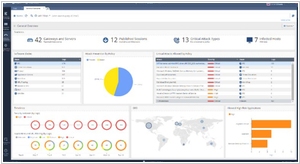Check Point vs Fortinet
August 04, 2023 | Author: Michael Stromann
Check Point and Fortinet are two major players in the cybersecurity industry, each offering a wide array of security solutions. One of the key differences between the two lies in their core strengths and product focus. Check Point primarily emphasizes network security and has a strong reputation for its next-generation firewalls and threat prevention capabilities. Their solutions often come bundled in unified security appliances, providing comprehensive protection against a range of cyber threats, from malware to advanced persistent threats (APTs). Fortinet, on the other hand, is renowned for its integrated security fabric, offering a holistic approach to cybersecurity with a broad portfolio of products, including firewalls, endpoint protection, secure access, and more. Their emphasis on integration aims to provide seamless visibility and management across all security components within an organization's network.
Another notable difference lies in their target markets. While both Check Point and Fortinet cater to enterprises of varying sizes, Fortinet has a stronger presence in the mid-market and smaller businesses due to their focus on providing scalable and cost-effective solutions. Fortinet's pricing structure and offerings make it particularly appealing for organizations with limited resources seeking robust cybersecurity solutions without compromising on performance. Check Point, on the other hand, has a more established presence in the large enterprise and government sectors, where their advanced threat prevention capabilities and long-standing reputation have garnered trust and loyalty.
Additionally, the user interface and management experience differ between the two. Check Point typically features a more straightforward and intuitive interface, making it easier for security administrators to configure and manage policies. Fortinet, with its extensive suite of products and integrated approach, may have a steeper learning curve for administrators but provides greater flexibility and customization options for more complex network architectures. Ultimately, the choice between Check Point and Fortinet boils down to an organization's specific needs, budget, and existing network infrastructure.
See also: Top 10 Cloud Security Software
Another notable difference lies in their target markets. While both Check Point and Fortinet cater to enterprises of varying sizes, Fortinet has a stronger presence in the mid-market and smaller businesses due to their focus on providing scalable and cost-effective solutions. Fortinet's pricing structure and offerings make it particularly appealing for organizations with limited resources seeking robust cybersecurity solutions without compromising on performance. Check Point, on the other hand, has a more established presence in the large enterprise and government sectors, where their advanced threat prevention capabilities and long-standing reputation have garnered trust and loyalty.
Additionally, the user interface and management experience differ between the two. Check Point typically features a more straightforward and intuitive interface, making it easier for security administrators to configure and manage policies. Fortinet, with its extensive suite of products and integrated approach, may have a steeper learning curve for administrators but provides greater flexibility and customization options for more complex network architectures. Ultimately, the choice between Check Point and Fortinet boils down to an organization's specific needs, budget, and existing network infrastructure.
See also: Top 10 Cloud Security Software




